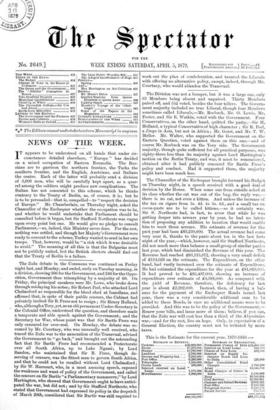The Zulu debate in the Commons was continued on Fnday
night last, and Monday, and ended, early on Tuesday morning, in a division, showing 306 for the Government, and 246 for the Oppo- sition, Government thus triumphing by a majority of 60. On Friday, the principal speakers were Mr. Lowe, who broke down through mislaying his notes ; Sir Robert Peel, who attacked Lord Chelmsford as responsible for the blood shed at Isandlana, and affirmed that, in spite of their public censure, the Cabinet had privately invited Sir B. Frere not to resign ; Sir Henry Holland, who, although a Tory, yet, as an old permanent Under-Secretary in the Colonial Office, understood the question, and therefore made a temperate and able speech against the Government; and the Secretary for War, whose point was that Sir Bartle Frere was only censured for over-zeal. On Monday, the debate was re- sumed by Mr. Courtney, who was unusually well received, who traced the Zulu war to the annexation of the Transvaal, advised the Government to " go back," and brought out the astounding fact that Sir Bartle Frere had recommended a Protectorate over all South Africa, up to Lake Ngami ; by Lord Bandon, who maintained that Sir B. Frere, though de- serving of censure, was the fittest man to govern South Africa, and that he could not be recalled without Lord Chelmsford ; by Sir W. Harcourt, who, in a moat amusing speech, exposed the weakness and want of policy of the Government, and called the censure on Sir Bartle "a Parliamentary manoeuvre;" by Lord Harlington, who showed that Government ought to have antici- pated the war, but did not; and by Sir Stafford Northcote, who stated that Government had expressed its policy in the despatch of March 20th, considered that Sir Bartle was still required to
work out the plan of confederation, and taunted the Liberals with offering no alternative policy, except, indeed, through Mr. Courtney, who would abandon the Transvaal.


































